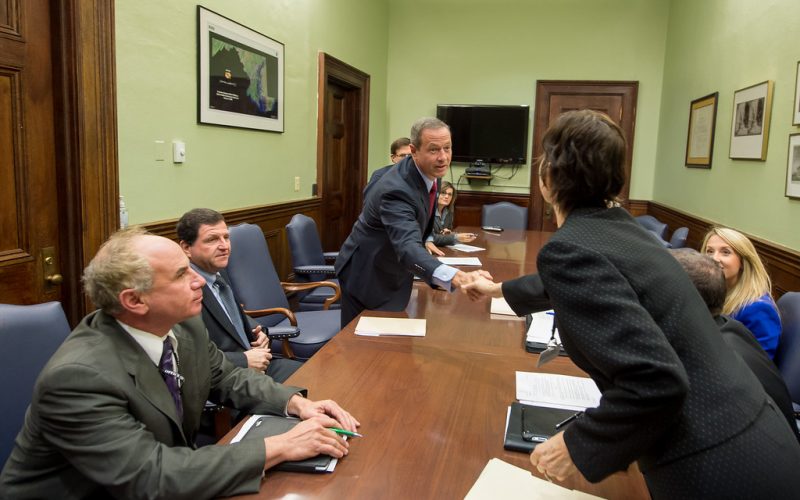In the grand scheme of nearly indecipherable acronyms in child welfare investigations, one particular abbreviation stands out as being part of nearly every case but nonetheless being misunderstood by most parents. The “TDM,” or “team decision-making meeting,” is an important step in the resolution of child welfare investigations that proceed beyond initial screening. In nearly every matter that results in a dependency or in-home intervention filing with the Superior Court, the Department of Child Safety (“DCS” or the “Department”) schedules a TDM. What is a TDM? To answer that question and explain why the TDM is important, we must first understand typical DCS investigative procedures.
When someone calls the DCS hotline in Arizona to report suspected child abuse, a series of steps must be taken. If the allegation is an emergency, a DCS specialist visits the child’s home immediately or within 24 hours. If DCS involves law enforcement, the police will also visit the home and conduct a concurrent criminal investigation. For less serious allegations, DCS assigns a caseworker who visits the home within a few days. In both instances, DCS provides the accused parents with a Notice of Duty to Inform document stating that the parents are the subject of a DCS investigation and that DCS may use anything the parents say in their investigation [1].
Pursuant to Arizona DCS Policy, if DCS determines the child is in present danger and the superior court issues an order authorizing removal, they may take the child into temporary custody [2]. If exigent circumstances exist, DCS immediately takes the child into temporary custody without prior authorization from the court. When this occurs, a physician examines the child and returns them to the parents unless the exam reveals abuse or neglect, in which case DCS may retain custody for up to twelve hours. DCS then gives the parents a Temporary Custody Notice (TCN), which outlines the reasons the child was taken into custody and states a preliminary protective hearing will be held in 5 to 7 days [3]. Absent exigent circumstances, a child shall not remain in temporary custody for more than 72 hours, not including weekends and holidays, and the parents must sign a Voluntary Placement Agreement to exceed that time without a court order approving the removal [4]. In practice, DCS could have custody for a few days to roughly two weeks before the parents have an opportunity to be heard in court.
Usually before the initial dependency or preliminary protective hearing, DCS schedules a TDM. At the TDM, the involved family members (parents, other adults living in the home, potential placements, etc.), the investigative case manager, their supervisor, and any other interested parties gather for a “collaborative decision making process” to discuss the “safety, caregiver arrangements, and permanency of the children” [5]. Because DCS tries to encourage collaboration, many parties, including friends and relatives, are permitted to offer their thoughts on how best to serve the child’s interests. Because the TDM is fairly informal and any interested person who attends may have an opportunity to speak, the TDM can take anywhere from 30 minutes to two or three hours.
According to the Arizona DCS Program Policy, there are six types of TDMs. In some circumstances, a TDM may be held before removal or at any point during the proceedings. For example, DCS can schedule a TDM for an in-home dependency or intervention. However, the most common type is a Present Danger TDM, which should take place 48 hours after DCS has obtained temporary custody of the child, or a Safety Planning TDM, in which parties discuss whether the current safety plan is effective and being followed. If a parent is not compliant with the safety plan, DCS may decide to remove the children from the parent’s care or impose greater restrictions on one or both parents while the investigation proceeds.
A trained TDM Facilitator, a DCS employee, manages and documents the meeting. Pursuant to Arizona DCS Program Policy, the Facilitator guides group discussion and attempts to reach a consensus with the family about how to protect the child [6]. In theory, the TDM is meant to be conducted before the Department makes its final decision regarding whether to remove the child or file a dependency petition in the juvenile court; however, TDMs often occur after DCS has already made its decision (and sometimes after they have already filed the dependency petition unbeknownst to the parents). In these cases, the practical purpose of the meeting is for DCS to gather additional information to use in their Petition and, potentially, for the police to use in a concurrent criminal action. Critically, the record kept by the TDM facilitator is not typically subject to review for accuracy by the accused parents, often leading to differing opinions about what actually occurred in the meeting.
Because DCS presents TDMs as collaborative discussions (rather than adversarial processes like parents expect to see in court), accused parents often arrive unrepresented and unprepared. Without counsel present, the parents may admit to facts and give statements that DCS later uses in dependency court. Further, because the investigative case manager and their supervisor are usually present at the TDM, the parents may feel compelled to talk and be admonished if they “refuse to cooperate” or “do not take enough interest in their child’s well-being” by not speaking about the allegations during the meeting. Under A.R.S. § 8-843(B)(2), the accused parents are not entitled to appointed counsel until the initial dependency hearing, which occurs after a Petition for Dependency is already filed. This means that, at the TDM, the accused parents are not encouraged to hire counsel, nor are they even aware that consulting with an attorney before the meeting would be beneficial.
Even if the accused parents are represented by counsel and coached on how to respond in the TDM, the stress of losing custody of a child can cause the parents to make potentially damaging statements. Parents must decide whether to risk responding to the allegations at the TDM, where their answers or refusals to answer may be used against them later. Further, the caseworker is technically a represented party—the Department’s counsel is the Attorney General—which means that DCS usually informs attorneys that they cannot speak to the caseworker at the TDM lest they risk violating the Arizona Rules of Professional Conduct for lawyers [7] . DCS gives the accused parent’s counsel a document that warns them of the potential consequences of communicating with the caseworker.
However, having an attorney present is likely to help mitigate the risks associated with these “team” meetings. Attorneys can help determine whether the client should respond to a question and assist the client in clarifying their statements to DCS. This way, DCS is less able to take statements said during the TDM out of context if they file a Dependency Petition. Additionally, the mere presence of an attorney can change the tenor of the conversation, which can cause the caseworker to conduct the TDM more formally and ensure closer compliance with the Program Policy. Moreover, if the Department learns that one or both parents will bring private counsel to the TDM—the parents do not qualify for appointed counsel before the dependency petition is filed—the caseworker may ask an Assistant Attorney General to attend. This sometimes leads to discussions between counsel that can help resolve the case more quickly and with less intrusive legal intervention in the family sphere.
In theory, TDMs are beneficial to all parties involved because they bring everyone together to discuss concerns about the child’s welfare. However, in practice, TDMs can be elongated, stressful processes that parents accused of child abuse or neglect often attend without representation or advice from a knowledgeable child welfare attorney. Having counsel may help ease the stress of the process and ensure that the accused parents refrain from making potentially harmful statements even if the attorney does not attend the TDM. Ultimately, parents often feel that they are not part of the “team” in “team decision-making” meetings, but it is always worth consulting with counsel first to understand the purpose of the TDM and some of the potential outcomes.
[1] A.R.S. § 8-803.
[2] See also A.R.S. § 8-821(A)(1).
[3]https://extranet.azdcs.gov/DCSPolicy/Content/Practice%20Guides%20&%20Additional%20Info/Glossary.htm; see also A.R.S. § 8-823.
[4]https://extranet.azdcs.gov/DCSPolicy/Content/Program%20Policy/02%20Investigation_Asssessment_Case%20Planning/CH2_S04%20Present%20Danger%20Assessment%20Planning.htm; see also A.R.S. § 8-821(H) (2020).
[6] Id.
[7] Arizona Rules of Professional Conduct, ER 4.2, prohibits a lawyer from communicating with a party the lawyer knows to be represented by another lawyer in the matter unless the party’s attorney gives permission. That said, comment 1 to the rule states that some communications, such as those with a government agency (like DCS), are permitted by law. It is not clear whether DCS caseworkers can wall off communications with the parent’s attorney in this way before the dependency filing, but the Department certainly believes they can and usually restricts the parent’s lawyer from speaking directly to any DCS employees during a TDM.
Deandra Arena is an attorney at Woodnick Law, PLLC. She previously was an Assistant Attorney General for the Protective Services Section (representing DCS) in Arizona.
Isabel Ranney is currently working at Woodnick Law as a law clerk and is in her second year of law school at Sandra Day O’Connor College of Law at Arizona State University.
Woodnick Law, PLLC is a boutique family, juvenile, and criminal law practice with a main office in Phoenix, Arizona and a satellite office in Flagstaff. Services are provided throughout Arizona including Yavapai, Mohave, Yuma, Coconino, Maricopa, Pinal, and Pima Counties.



